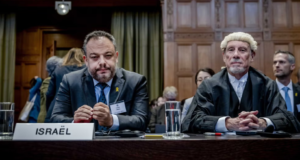A Grassroots Campaign for the Protection of Foreign Passport Holders Residing in and/or Visiting the oPt
Position Statement
To date, Israeli authorities have failed to provide a transparent policy on which foreign nationals wishing to enter or maintain their presence in the occupied Palestinian territory (oPt) can rely. Instead, Israel has continued to pursue both policies and practices that fail to comply with International Humanitarian Law. In fact, the de facto policy announced in December 2006 and again in March 2007 signals Israel’s intent to continue to violate international law. The failure of third states to object in such circumstances implies acceptance and violates their own obligations in international law.
Until such time as the Israeli occupation has ended and the sovereign Palestinian right of self-determination is fully implemented, the Campaign takes the following positions regarding Israel’s exercise of discretion over entry into the occupied Palestinian territory (oPt), and the corresponding responsibilities of third states:
1. Procedures outlined in announcements by the Israeli Ministry of Defense (December 2006) and the Israeli Ministry of Foreign Affairs (March 2007) fail to address a number of critical issues, especially the fundamental issue of how Israel will exercise its discretion over entry into the oPt. (See “Background” section below.)
2. Residents of the oPt, like people the world over, have the right to marry at will and to live together with their families. By maintaining its general refusal to permit foreign nationals to securely and permanently reside with their family members in the oPt, Israel, as the occupying power, is blatantly violating international humanitarian law (IHL). Third states have a duty to ensure Israel’s respect for IHL and to obtain Israel’s compliance in this case, where the means to do so are readily available to them.
3. Third states have an obligation to scrutinize Israel’s exercise of authority and to oppose arbitrary denials of entry and residency that harm Palestinian family life and welfare, including educational and social service institutions and economic development.
4. Third states have an obligation to defend the interests of their own nationals when they are subjected to arbitrary or discriminatory treatment by a friendly state and to protect them against violations of human rights including Israeli use of duress in coercing foreigners to collaborate with the occupier in order to gain entry into the oPt.
5. Third states have an obligation to object when they are provided written statements and clarifications of positions from Israel that embody, or envisage and signal Israel’s intent to take measures that are internationally unlawful. Third state failure to object in such circumstances implies acceptance and violates its own obligations in international law, in particular, the duty not to acquiesce to internationally unlawful acts by other states. The duty of non-acquiescence by third states extends to the failure to react upon notification of the establishment or existence of an illegal policy.
The Campaign urges third states to:
1. Ensure Israeli implementation of the rights to family unity and family reunification and the
establishment of clear and transparent procedures for foreign nationals seeking to reside in the oPt, in keeping with international law.
– obtain Israeli cancellation of CoGAT’s stipulation that foreigners are restricted to a 27-
month, single entry, maximum stay
– demand Israel’s adoption and implementation of a clear, transparent policy for issuing
residency permits to foreign nationals
2. Call for an immediate halt to Israel’s arbitrary and abusive practice of denying entry to foreign nationals traveling to the oPt.
– demand Israel’s adoption and implementation of a clear, transparent policy for unhindered
access to the oPt by foreign nationals
– obtain explicit assurances that people who have previously been denied entry will be
permitted to re-enter the oPt
– end the practice of issuing permits that restrict exit and re-entry
– end the practice of issuing permits of less than three months to those traveling to the oPt
– cease the collective punishment of those whose relatives may have ‘overstayed’ their
original visa duration
3. Apply vigorous scrutiny to cases of denied entry and denied residency in the oPt with a view to promoting Israel’s adoption and transparent application of principles consistent with the internationally accepted rights and obligations of an occupying power.
– set up clear mechanisms for citizens to report and appeal cases of denied entry
– set up clear mechanisms for liaising with Israeli authorities to ensure safe passage to the oPt
for all citizens and ensure the prompt and proper resolution of cases where safe passage has
been hindered
– insist on receiving a formal explanation of each decision taken by Israel to bar any of their citizens from the oPt
– object to all arbitrary denials of entry and residency that harm Palestinian family life,
educational, health and social service institutions and businesses and act to resolve all such
cases of exclusion.
4. Respect the duty of all states not to acquiesce to internationally unlawful acts, bearing in mind that failing to object to prima facie unlawful acts or policies when notified of them implies accepting them as lawful
5. Promote Israel’s compliance with International Humanitarian Law with appropriate and effective tools of persuasion and dissuasion. Take appropriate measures based on reciprocity to ensure that the correct treatment accorded Israeli nationals seeking to enter third countries is reciprocated by correct treatment of their nationals seeking to enter Israel or the oPt
Background
Israel’s arbitrary and abusive exercise of discretion over entry into the oPt continues to cause serious and unjustified harm to Palestinian families, educational and social service institutions and businesses in the oPt. In December 2006, the Israeli Ministry of Defense — Coordinator for Government Activities in the Territories (CoGAT) outlined1 new procedures for entry into the oPt. In March 2007 a similar statement was issued by the Israeli Ministry of Foreign Affairs and addressed to third state missions. Despite reported assurances from Israeli officials that under the new procedures entry denials would be based on legitimate security considerations, documented cases of persons denied entry indicate that the practice resulting from the implementation of announced procedures remains arbitrary, abusive and internationally unlawful. Furthermore, persons who fall within the categories that Israel has declared eligible for entry and visa renewal are being barred from doing so in practice.
The two notices issued by Israeli authorities address only the issue of temporary admissions (typically granted for short term family visits, tourism and humanitarian, business, educational or other professional activities). Procedures for granting residency to foreign nationals whose center of life is in the oPt remain unaddressed.2 Israel’s continued refusal to process family reunification applications directly affects as many as 500,000 to 750,000 people who may be forced to leave the oPt to keep their families intact. Together with the many foreign nationals who have established their primary business, investment or professional activities in the oPt, or otherwise aspire to build their lives in the oPt, the new procedures place them, at best, in a state of continuous uncertainty under constant threat of expulsion and exclusion.
Israel’s announcements arbitrarily and unreasonably limit the categories of residents and travelers eligible to apply for permits to the oPt. No provisions are made for the right of dependent children above the age of 16 to reside with their parents in the oPt. Similarly, no provision is made for the eligibility of adult children and siblings, grandparents or in-laws to visit or reside with their families. Such exclusions are devastating to social stability and family welfare in the Palestinian community which relies heavily on the extended family as an essential provider of care across several generations for both the young and the elderly. If a key family member is denied entry, extended family units are often forced to relocate. Also excluded from the list of eligible categories are tourists, putting travelers at risk of being arbitrarily barred from entry and further undermining the already fragile Palestinian economy.
1 On December 28, a letter announcing new procedures for foreign nationals wishing to visit, live or work in the oPt was sent by CoGAT to Dr. Sa’eb Erakat head of the PLO Negotiation Affairs Department, and several diplomatic missions in Tel Aviv, including the German (currently representing the EU-presidency) and US Embassies. On 5 March, the Israeli Ministry of Foreign Affairs issued a similar statement entitled “Transit Policy to the West Bank via Israel.” The letter was again distributed to embassies in Tel Aviv.
2 Those eligible for visa renewals may receive a maximum of 27 months residency followed by a mandatory departure with no assurance of return. Moreover, visa periods are restricted to a single entry.
Additionally, the notices offer no prospective solution to any of the thousands of individuals who have remained in the oPt after the expiration of their original visas owing to the refusal of the Israeli authorities to process duly submitted visa renewal applications. The notices also fail to offer a clear solution for the untold numbers of individuals and their families who have been forced to relocate out of the oPt due to previous entry denials unjustly issued by the Israeli authorities. Finally, the notices provide no indication that foreign nationals seeking entry into occupied East Jerusalem or the Gaza Strip will be eligible to apply for temporary admission or visa extensions.
Failure to implement announced procedures
The limited procedures outlined in the announcements by the Israeli Ministry of Defense (12/06) and the Ministry of Foreign Affairs (3/07) are not being implemented in a transparent or consistent fashion.
1. Individuals falling within the categories declared eligible by Israel have been denied entry at all major ports of entry — Allenby Bridge, Sheikh Hussein Bridge and Ben Gurion Airport.
2. Documented cases include men, women and children, ranging from 2 to over 70 years in age. The overwhelming majority of documented cases since January 2007 involve US citizens. Citizens of Australia, Canada and EU member countries as well as countries in Latin America, East Asia, the Middle East and Eastern Europe have also been denied entry.
3. Procedures set out in the announcements are not being implemented in a clear, consistent and transparent manner.
* Individuals at Allenby Bridge who have sought explanation for their denial of entry have been physically abused and forced back into vehicles returning to Jordan.
* Individuals who have previously traveled to the region on a regular basis have been denied entry for the first time. Others who have never visited the country have also been denied.
* Individuals who were denied entry in 2006 and were then able to obtain some form of clearance to enter have again been denied entry in 2007.
* Israeli assurances to third state diplomatic representatives that particular nationals would be granted entry have not been honored in several instances.
* Individuals seeking to apply for permits from Israeli embassies / consulates in their home countries to enter the West Bank (the procedure “recommended” in CoGAT announcement) have been informed upon inquiry that this procedure is not in effect.
* Individuals have been denied entry without access to a CoGAT representative contrary to stipulations in the CoGAT announcement.
* Many of the individuals permitted to enter have been able to do so only through exclusive arrangements – often for fees including sometimes exorbitant fees to lawyers.
Some individuals are being required to provide monetary deposits (between NIS 20,000 and 50,000) to guarantee their departure before the expiration of their visas.
* The duration of visas issued to those granted entry varies widely and is determined without clear reason or explanation. The Campaign’s documentation includes cases of individuals granted visas for as little as one week and suggest that the Israeli authorities are increasingly issuing visas of shorter duration to those indicating the intention to travel to the oPt. This practice also appears intended to frustrate objections by third states to Israel’s arbitrary denials of entry and refusal of residency rights in the oPt
* Despite a limited reactivation of visa extension processes, cases documented by the Campaign suggest that Israel’s granting of visa extensions remains arbitrary. Moreover, permit validity ends upon exit from Israel. Fear of a subsequent denial of entry has caused persons affected by this practice to forgo necessary health care treatments, education, training or economic development activities abroad for fear they will be denied entry on their return.
4. The welfare and integrity of countless Palestinian families continue to be affected by separation or the imminent threat of separation.
* Spouses remain separated despite provisions in the CoGAT announcement for issuing and renewing visas to spouses.
* Young children continue to be separated from their parents and the elderly are denied visits and essential care from their immediate family.
5. The functioning of Palestinian health, educational and social services and businesses continues to be undermined by Israeli practices.
6. Members of the international press have been denied entry to Israel and the oPt.
For more info, contact the Right of Entry Campaign:
059.817.3953
info@righttoenter.ps
 International Solidarity Movement Nonviolence. Justice. Freedom.
International Solidarity Movement Nonviolence. Justice. Freedom.


